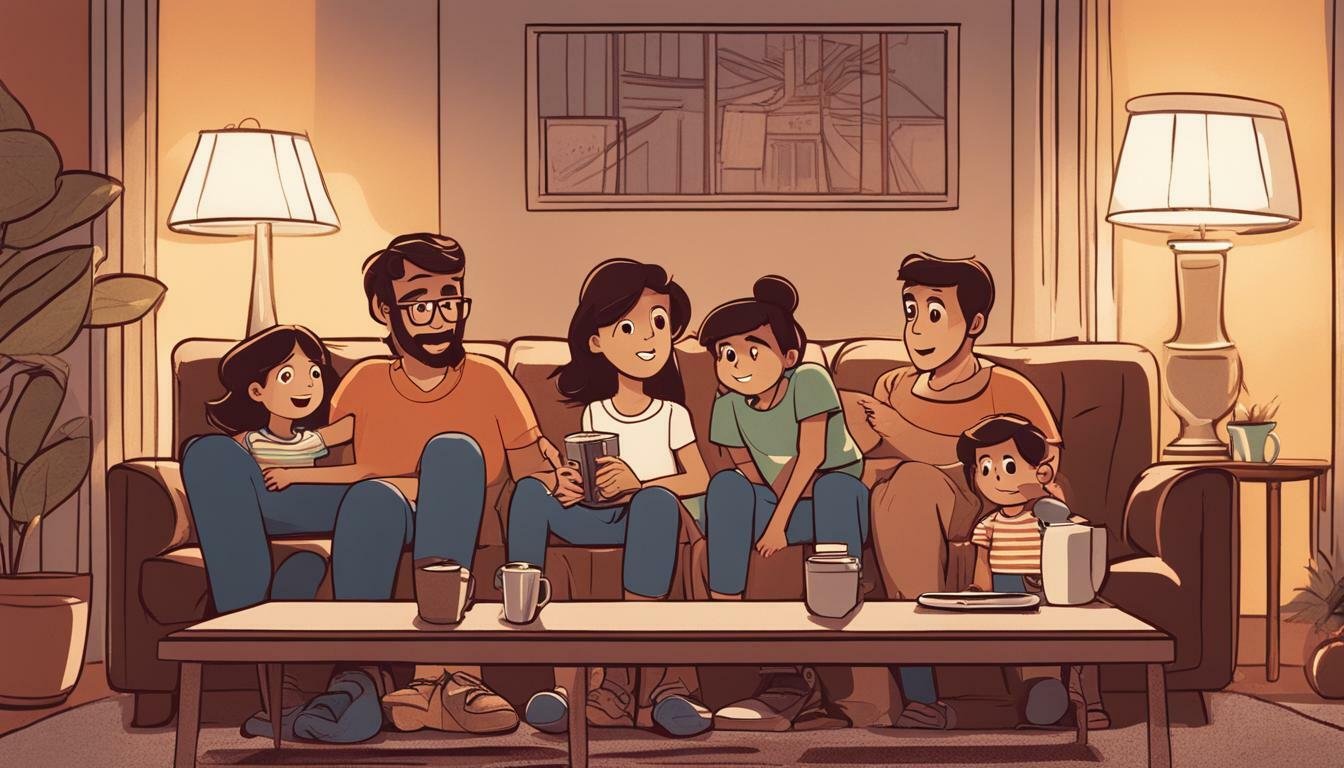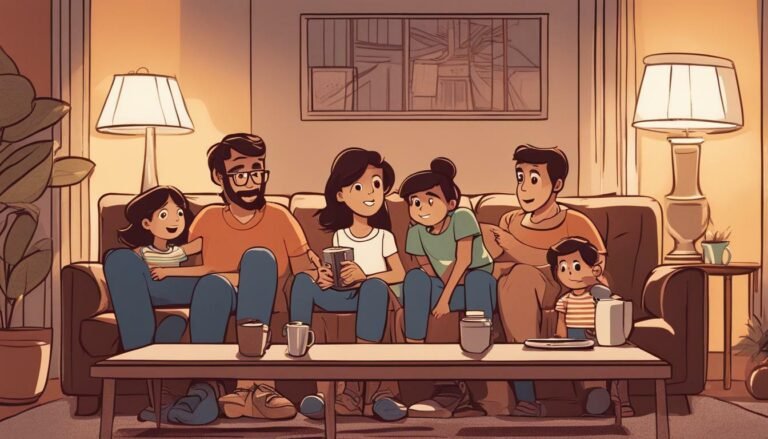
If you’re a parent who’s wondering whether “A Beautiful Mind” is an appropriate movie for your children, you’re in the right place. As a professional copywriting journalist, I’ve watched the movie and analyzed its content to help you make an informed decision for your family.
In this A Beautiful Mind Parents Guide, we’ll cover what the movie’s rating means and whether there are any age restrictions. We’ll also highlight the film’s themes, provide insights on how to approach sensitive mental health topics with your kids, and offer discussion points for after the movie.
Key Takeaways:
- Our guide will provide helpful insights on A Beautiful Mind to watch the movie with kids.
- We’ll cover the film’s rating and age restrictions, themes, sensitivity to mental health topics, and post-movie activities.
- Following our guide, you can navigate the film’s content and ensure a valuable viewing experience for the entire family.
Understanding the Movie’s Rating and Age Restrictions
Before watching “A Beautiful Mind” with your kids, it’s important to understand the movie’s rating and age restrictions. The film has been rated PG-13 by the Motion Picture Association of America (MPAA), which means that parental guidance is suggested for children under 13 years of age.
The movie contains mature content and some scenes that may be too intense or disturbing for younger viewers. While the film does not feature any explicit violence or sexual content, it does contain scenes of mental illness that may be upsetting.
If you’re unsure whether “A Beautiful Mind” is appropriate for your child, it’s always a good idea to watch the movie yourself before viewing it with your kids. This will give you a better understanding of the content and help you gauge whether it’s suitable for your family.
Additionally, certain scenes and themes may require parental discretion due to their portrayal of mental illness. It’s important to be aware of your child’s emotional state and initiate age-appropriate conversations regarding the topic.
Overall, “A Beautiful Mind” is a powerful and thought-provoking film that can offer valuable lessons to both children and adults when approached with parental guidance and sensitivity to mental health topics.
Family-Friendly Themes and Messages in “A Beautiful Mind”
Despite its focus on mental illness, “A Beautiful Mind” presents several family-friendly themes and messages that parents can explore with their children.
One of the most apparent themes is the power of love and support. John’s wife, Alicia, stands by him through his struggles and helps him cope with his illness. This message can be a valuable lesson for kids, emphasizing the importance of being there for loved ones during difficult times.
The movie also highlights the value of perseverance and determination. John Nash’s pursuit of his mathematical theories, even in the face of adversity, can inspire kids to pursue their passions and goals with courage and resilience.
Examples of Family-Friendly Themes in “A Beautiful Mind”:
| Theme | Description |
|---|---|
| Support and Love | The power of standing by loved ones through difficult times. |
| Perseverance and Determination | The courage to pursue one’s passions and goals in the face of adversity. |
| Friendship and Community | The importance of building meaningful connections and finding support in others. |
By examining these themes and messages, parents can use “A Beautiful Mind” as a vehicle for valuable discussions on important life lessons.
Sensitivity to Mental Health Topics
As a parent, it’s essential to be sensitive to mental health topics when watching “A Beautiful Mind” with kids. The movie portrays a character with severe schizophrenia, and some scenes may be distressing for children to watch.
Parents should exercise discretion when deciding whether the movie is appropriate for their children and consider their ages and maturity levels. The parental guidance rating means that the film contains content that may not be suitable for all ages, and parents should be cautious about exposing their kids to potentially upsetting or triggering scenes or themes.
It’s important to initiate age-appropriate conversations with your children about mental health. You can help them understand that mental illness is a treatable condition and encourage them not to stigmatize people with mental health disorders.
If your children have questions or concerns after watching “A Beautiful Mind,” it’s essential to offer support and provide age-appropriate information about mental health. You can also recommend other movies or resources that present mental health topics in a positive or educational light.
Providing Support and Guidance
The movie portrays the impact of mental illness on both the individual and their loved ones. Watching the movie as a family can be an opportunity to discuss the importance of empathy, support, and understanding for people with mental health conditions.
- Encourage your children to ask questions about the movie, and create a safe space for them to talk about their feelings or concerns.
- Offer age-appropriate information about mental health and emphasize that people with mental health conditions can lead fulfilling lives with proper treatment and support.
- Reassure your children that they can talk to you about any mental health issues they may be experiencing or witnessing in their daily lives.
By providing support and guidance to your children after watching “A Beautiful Mind,” you can help prevent stigma and promote understanding and empathy towards people with mental health conditions.
Discussion Points and Reflections After Watching “A Beautiful Mind”
Watching “A Beautiful Mind” can be an emotional experience, and it’s important to engage in meaningful discussions with kids afterward. Here are some discussion points and reflection activities to promote critical thinking and empathy:
- Explore the concept of mental illness: Discuss what mental illness is and how it affects people. Ask your child what they thought about the portrayal of mental illness in the movie and whether it changed their perceptions or understandings.
- Discuss the importance of community: Talk about the community that supported John Nash and how it affected his life. Ask your child what they think about the importance of community and how it can help people in difficult times.
- Reflect on overcoming challenges: Discuss how John Nash overcame his challenges and persevered through his struggle with mental illness. Ask your child to reflect on their own challenges and how they have overcome them. Encourage them to identify strategies that have worked for them and share them with the group.
- Explore mental health resources: After watching the movie, discuss mental health resources available in your community and how they can help people dealing with mental illness. Include crisis hotlines, counseling services, and support groups.
- Explore mathematical concepts in the movie: John Nash was a brilliant mathematician, and the movie includes several scenes involving mathematical concepts. Ask your child to explain what they understood and whether the movie helped them appreciate math in a new way.
- Reflect on the movie’s theme: The movie’s theme revolves around the power of the mind and the importance of resilience. Ask your child to reflect on what this theme means to them and how it can be applied to their life.
These discussion points and reflection activities are just a starting point. Use them to spark meaningful conversations and encourage your child to think critically about the movie’s themes and messages.
Conclusion
In conclusion, “A Beautiful Mind” is a captivating film with many positive messages and themes. As a parent, it’s important to understand the movie’s rating and age restrictions before deciding whether it’s appropriate for your child to watch.
While the movie does contain some sensitive themes related to mental health, it can serve as a valuable tool for initiating important conversations with your children about these topics. Remember to exercise parental discretion when needed and offer support and guidance to your child throughout the movie.
After watching “A Beautiful Mind,” take the opportunity to engage in reflection and discussion activities with your child. This can deepen their understanding of the movie’s themes and provide valuable opportunities for personal growth and development.
Overall, “A Beautiful Mind” can be a valuable viewing experience for the whole family. By following this parents guide and applying sensitivity, empathy, and understanding, you can ensure a meaningful and educational movie experience for all.
FAQ
Q: What is the rating of “A Beautiful Mind” and are there any age restrictions?
A: “A Beautiful Mind” is rated PG-13 for intense thematic material, sexual content, and language. The movie is generally suitable for teenagers and adults. Parental discretion is advised for younger viewers.
Q: What are the family-friendly themes portrayed in “A Beautiful Mind”?
A: “A Beautiful Mind” explores themes of perseverance, love, and the power of the human mind. It can serve as a valuable discussion point for parents and children, promoting critical thinking and empathy.
Q: Are there any sensitive scenes or themes related to mental health in the movie?
A: Yes, “A Beautiful Mind” depicts mental illness and its impact on the protagonist’s life. Some scenes may require parental discretion, and it’s important to have age-appropriate conversations about mental health with children.
Q: What should I talk about with my kids after watching “A Beautiful Mind”?
A: After watching the movie, you can discuss themes such as the importance of resilience, the impact of mental health on individuals and their loved ones, and the power of support and understanding.
Q: Is “A Beautiful Mind” suitable for family viewing?
A: “A Beautiful Mind” can be a thought-provoking and educational film experience for both kids and adults. By using this parents guide, you can navigate the content, engage in meaningful discussions, and ensure a valuable viewing experience for the entire family.
- Self Harm Awareness Ribbon Color: Unveiling Its Meaning - August 21, 2023
- What Is Emotional Self Awareness: A Guide to Inner Growth - August 21, 2023
- Self Harm Awareness Bracelets: Show Support and Share Hope - August 21, 2023


